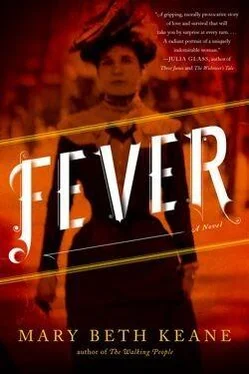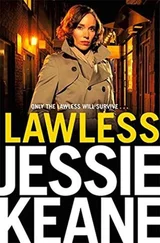It will come as a shock to her, Alfred knew. She might not be able to make ends meet without him. She mightn’t be able to send the boy to school. But she’ll take on another boarder. A woman would be better for her, and the neighbors would like it more. I’ll send her a letter, he decided as he turned and made his way back down to the street. It would be kinder to Liza to avoid the shame of having to watch him leave, or the temptation she might have to beg him to stay. It would be more honorable to allow her to face that on her own and then she could tell Samuel whatever she liked. Alfred would simply never return to Orchard Street at all. As for the few articles he’d left behind in her place, she could do what she liked with them.
Then he remembered he had thirty-one dollars saved in a coffee can on the top shelf of the pantry, and that stopped him as he crossed the first-floor landing. He looked up the dark stairwell and listened. After a few seconds, he shook his head and waved his hands in front of him as if he were scattering that paper money in the breeze. He stepped toward the heavy front door, believing he’d made his decision, but he thought of that money again as he placed his hand on the knob. He could see it as a stack, turned on its side and curved against the can. It smelled of coffee. What would Liza do with it? Buy books for the boy?
He climbed the stairs again. He placed the palm of his hand against the door and then turned the knob, slowly, slowly, so that the lock wouldn’t pop like a gunshot and wake her up. He pushed it open only far enough to slide his body inside and in three steps he was standing at the pantry, peering toward the top shelf. Empty. He scanned the lower shelves, the counter, the curio in the corner. The floorboard creaked as his thumb grazed the miniature collectable bell she’d gotten from Philadelphia, years and years ago from her husband, the boy’s father, dead at twenty-seven. Alfred was rooted in the still silence until he remembered the small hollow in the brick wall between the window and the curio, a little space gouged out long before his arrival and impossible to notice unless a person went looking for it. Liza had pointed it out to Samuel as a good place to keep his earnings, and Alfred went up on tiptoes now, reaching around the curio to find it in the moonlight. There was his coffee can, and next to it, a chipped sugar bowl full of the boy’s earnings. Graceful as a ballerina, he leaned down, plucked up both, and barely felt the floor under him as he slipped out the door, back to the hall, down to the street.
For the first time since taking the cure, he reached for the flask that held the medicine, and there on the dark sidewalk he tipped it into his mouth, pretended it was whiskey, and swallowed every drop. When he was finished, he waited to see if the medicine would do the trick, if it would take all that wanting away and turn it into satisfaction, into the calm easiness of sobriety as Dr. Oppenheimer had described it, the peace of needing nothing, of feeling sound in body and mind. Instead, he felt violence in his belly, and as quick as he could lean over, he vomited on himself and all over the step. He stumbled to the curb and vomited over the dog shit there. He dropped down to his hands and knees and vomited again. When he saw in the dim light of the gas lamp a policeman coming up the street with his hand on his club, he moved along as quickly as he could. He stuck close to the buildings and walked north until he came to a church with a small cemetery beyond its gates. He tried to vomit again but nothing came because there was nothing left, so he retched drily behind a headstone, wrapped his coat more tightly around his body, stumbled over to a bench, and slept.
In the morning, cold to the bone and with an aching neck, he made his way to Washington Square Park. The Borriello boy had said the laundry Mary worked at was almost on the park, but he hadn’t had a chance to tell him which side, how close “almost” was. Buttoned into the inside pocket of his coat was his thirty-one dollars, plus Samuel’s eleven. Eleven dollars was nothing compared to the dinners he’d put on their table, compared to all the pencils and books and scratch pads he’d purchased. The groceries, the new kitchen curtains, all acquired with the money he’d given her. She’d made out well, he told himself, the thick stack of money a lump on the left side of his coat.
He began searching at the park’s south end but found no laundry. There was a laundry a block from the park’s west side, but when he went in to inquire about Mary, they didn’t know who he was talking about. It was the same at the two laundries he found within a few blocks north of the park. Then, on the park’s east side, he spotted a sign and knew it must be the place. He watched a Chinese move around the front of the store, and then had a glimpse of her, passing through a back room, carrying a stack of folded clothes. Though the vomit had dried on his pants and shoes, the stench seemed as strong as it had been when fresh, and when he touched his hand to his face he knew that he needed a wash and a shave. He was hungry. He wanted to rinse his teeth. The Chinese came to the door, noticed him, and turned his back.
He needed to make himself presentable. He needed to consider what he’d say. Instead of speaking to her right then, as he’d planned, he walked to the old building and got himself into Driscoll’s rooms by the key Driscoll left over the frame of the door. He stripped in Driscoll’s kitchen and then went into the old man’s closet to find a shirt, pants, fresh socks, hurrying out of the contaminated room as quickly as he could. He found Driscoll’s blade and cream. When he was finished, and standing in the kitchen with Driscoll’s bedroom door shut tight, he made a mug of strong black coffee and sipped it beside the stove. He felt jumpy, as if being chased, as if those pursuing him were crouched outside in the street, spying on him from the upper floors of the buildings lining the avenue. He placed Driscoll’s key on the table and locked the door behind him.
• • •
He walked directly over to the laundry — it was near quitting time — but she would not see him. A Chinese looked him up and down with those inscrutable eyes and told him that she could not be disturbed. He told the man he would wait as long as he had to. He raised his voice and sent it toward the back of the shop, where the sounds of cranks and pulleys and the sudden hiss of steam went on as if he weren’t there at all. The smell of damp clothing and hot irons filled the small space, and he wondered if she smelled like that now — where before she’d smelled of fruit and fresh bread, now she might smell of starch and laundry powder. She’d heard him. He could feel it. She was listening. He told the Chinaman to call the police if he wanted to. He didn’t care. And then, not fifteen minutes later, he was back on the street again, walking into the wind that pricked his face like a hundred thousand needles, turning a shoulder to slice through the throngs hustling about with their packages tied up with string. He circled around the neighborhood for a while, and then went back to the laundry and stood outside the door.
“Mary,” he said, when she finally came out, as he knew she would, eventually. Two other women had already left, and the sign on the door said CLOSED. “I need to talk to you.”
She stayed several feet away from him on the sidewalk and wrapped her scarf around her head. “No, Alfred, I don’t think so. I think the time for talking is past.”
“I didn’t marry her, you know.”
Mary leveled a look at him. “And? What am I supposed to do? Thank you?”
“No! I only—”
“Go away, Alfred. Please. Leave me alone.”
He watched her walk away, and he waited for her to stop, look over her shoulder, think of something more to say to him. But she turned onto Greene Street and disappeared.
Читать дальше












